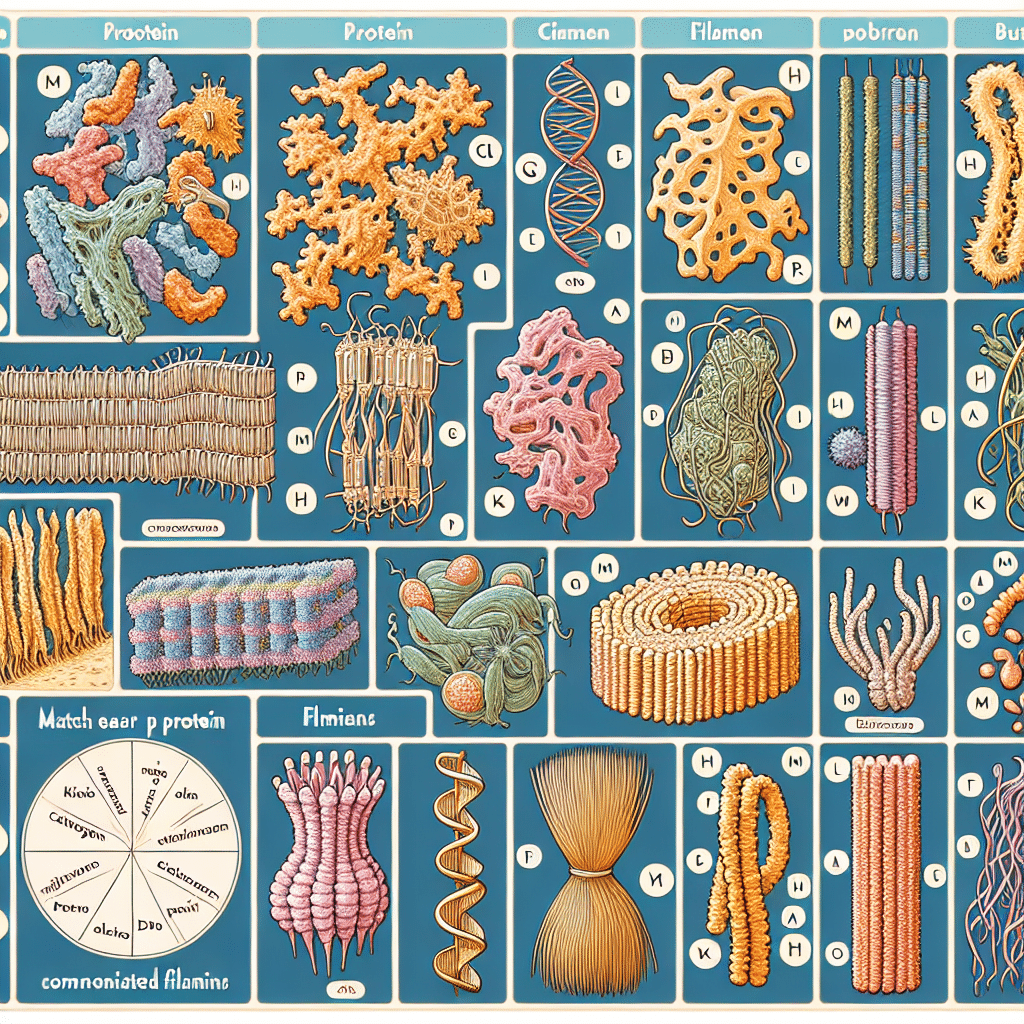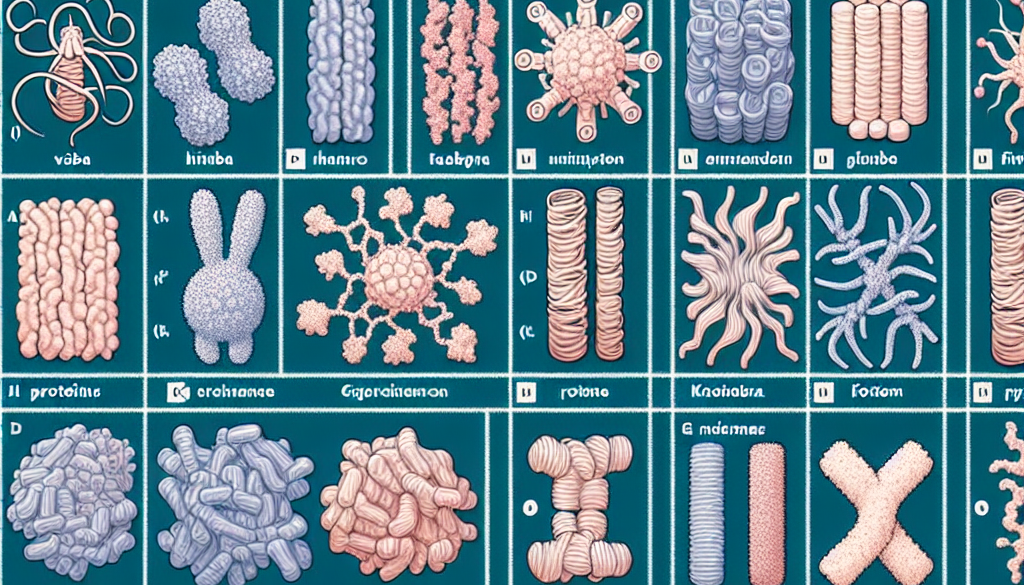Match Each Protein with the Appropriate Filament: Quiz Guide
-
Table of Contents
- Match Proteins to Their Corresponding Filaments: A Comprehensive Quiz Guide
- Introduction to Cellular Filaments
- Actin Filaments and Associated Proteins
- Microtubules and Their Binding Proteins
- Intermediate Filaments and Their Protein Partners
- Case Studies and Examples
- Statistics and Research Findings
- Conclusion: Key Takeaways
- Discover ETprotein’s High-Quality Protein Products
Match Proteins to Their Corresponding Filaments: A Comprehensive Quiz Guide

Understanding the intricate network of proteins and their corresponding filaments is crucial for students and professionals in the fields of biology, biochemistry, and molecular biology. This article serves as a detailed guide to help you match each protein with the appropriate filament, enhancing your knowledge and preparation for any related quizzes or exams.
Introduction to Cellular Filaments
Before diving into the specifics of protein-filament matching, it’s essential to understand the three main types of cytoskeletal filaments in eukaryotic cells:
- Actin filaments (microfilaments)
- Microtubules
- Intermediate filaments
Each type of filament has a distinct set of proteins associated with it, playing unique roles in cellular structure and function.
Actin Filaments and Associated Proteins
Actin filaments are dynamic structures composed of actin monomers. They are involved in various cellular processes, including muscle contraction, cell motility, and cytokinesis. Here are some key proteins associated with actin filaments:
- Myosin: This motor protein interacts with actin filaments to generate force for muscle contraction and other cellular movements.
- Tropomyosin: A regulatory protein that binds to actin filaments, controlling access to the myosin-binding sites on actin.
- Troponin: This protein complex regulates muscle contraction by controlling the position of tropomyosin on the actin filament.
- Arp2/3 complex: Involved in the nucleation of new actin filaments and branching of the actin cytoskeleton.
- Formins: Proteins that nucleate the formation of unbranched actin filaments and can remain associated with the growing plus end.
Microtubules and Their Binding Proteins
Microtubules are hollow tubes made of tubulin dimers that provide structural support and serve as tracks for intracellular transport. They are also essential for chromosome segregation during cell division. Some proteins associated with microtubules include:
- Kinesin: A motor protein that typically moves cargo toward the plus end of microtubules.
- Dynein: Another motor protein that moves cargo toward the minus end of microtubules.
- MAPs (Microtubule-Associated Proteins): A diverse group of proteins that stabilize microtubules and regulate their dynamics.
- Stathmin: A protein that binds to tubulin dimers, inhibiting their polymerization into microtubules.
- Gamma-tubulin: Found in the microtubule-organizing center (MTOC), it is critical for the nucleation of microtubules.
Intermediate Filaments and Their Protein Partners
Intermediate filaments provide mechanical strength to cells and are composed of various proteins, depending on the cell type. Some of these proteins include:
- Keratins: Found in epithelial cells, they form a network that provides resilience and strength.
- Vimentin: Common in mesenchymal cells, it supports cellular integrity and is involved in wound healing.
- Neurofilaments: Present in neurons, they maintain the diameter of axons, which is crucial for proper nerve conduction.
- Lamins: Located in the nuclear envelope, they provide structural support to the nucleus.
- Desmin: Found in muscle cells, it links myofibrils to each other and to the cell membrane.
Case Studies and Examples
Real-world examples illustrate the importance of correctly matching proteins to their filaments. For instance, mutations in keratin genes can lead to skin disorders like epidermolysis bullosa simplex, where the skin is fragile and prone to blistering. Similarly, defects in dynein can result in primary ciliary dyskinesia, a condition characterized by respiratory tract infections and reduced fertility due to impaired ciliary function.
Statistics and Research Findings
Research has shown that the dysregulation of cytoskeletal proteins is often associated with diseases. For example, studies indicate that approximately 30% of all cancers involve mutations that affect the actin cytoskeleton. Additionally, Alzheimer’s disease has been linked to abnormal tau protein aggregation, which disrupts microtubule stability.
Conclusion: Key Takeaways
In summary, understanding the relationship between proteins and their corresponding filaments is vital for comprehending cellular functions and the implications of their dysregulation in diseases. This guide provides a foundation for matching proteins to actin filaments, microtubules, and intermediate filaments, which is essential for students and researchers in the life sciences.
Discover ETprotein’s High-Quality Protein Products
If you’re looking for premium protein products for your research or product development, consider ETprotein’s offerings. Their extensive range of plant-based proteins, including organic rice protein, pea protein, and various seed proteins, are non-GMO, allergen-free, and have a neutral taste, making them suitable for a wide array of applications.
About ETprotein:
ETprotein, a reputable plant protein vegan protein Chinese factory manufacturer and supplier, is renowned for producing, stocking, exporting, and delivering the highest quality organic bulk vegan protein and plant proteins. They include Organic rice protein, clear rice protein, pea protein, clear pea protein, watermelon seed protein, pumpkin seed protein, sunflower seed protein, mung bean protein, peanut protein etc. Their offerings, characterized by a neutral taste, non-GMO, allergen-free attributes, cater to a diverse range of industries. They serve nutraceutical, pharmaceutical, cosmeceutical, veterinary, as well as food and beverage finished product distributors, traders, and manufacturers across Europe, USA, Canada, Australia, Thailand, Japan, Korea, Brazil, and Chile, among others.
ETprotein specialization includes exporting and delivering tailor-made protein powder and finished nutritional supplements. Their extensive product range covers sectors like Food and Beverage, Sports Nutrition, Weight Management, Dietary Supplements, Health and Wellness Products, and Infant Formula, ensuring comprehensive solutions to meet all your protein needs.
As a trusted company by leading global food and beverage brands and Fortune 500 companies, ETprotein reinforces China’s reputation in the global arena. For more information or to sample their products, please contact them and email sales(at)ETprotein.com today.














